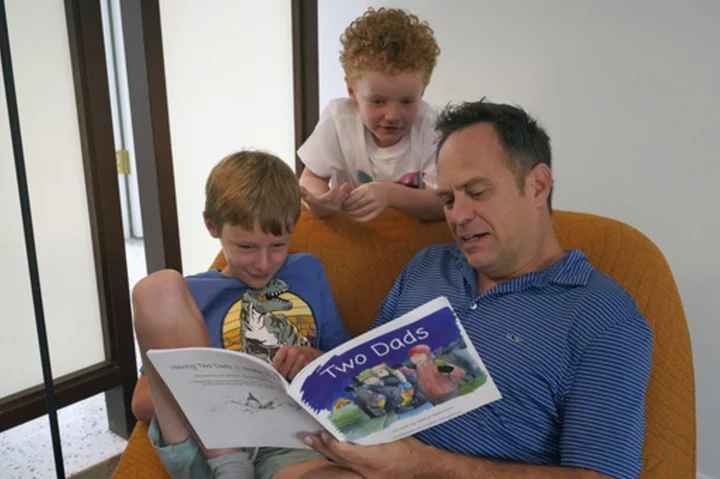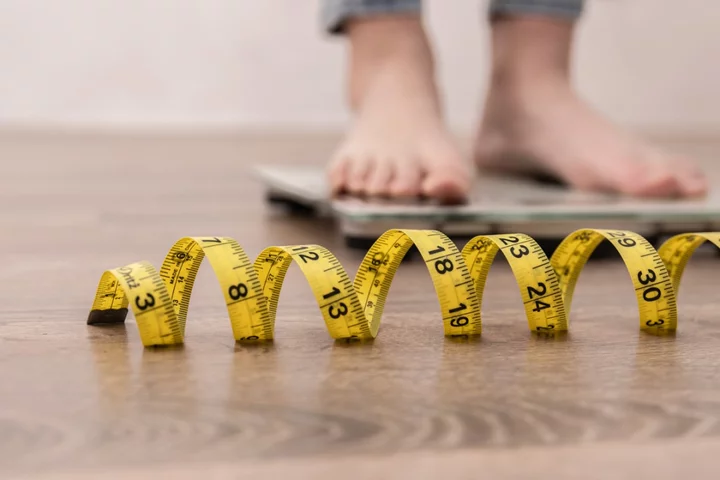
Selling Sunset’s Amanza Smith says she ‘almost died’ after suffering from spine infection
Selling Sunset star Amanza Smith has shared an update after undergoing surgery to treat an infection that spread from her bloodstream to her spine. The interior designer, who works at the real estate company The Oppenheim Group, has revealed in a new interview how osteomyelitis, a painful bone infection, had affected her lower vertebrae. Smith, 46, discovered the infection after experiencing severe backache that lasted nearly a month. After she collapsed while at her Los Angeles home back in May, her friend encouraged her to visit the hospital. “I thought I had a backache, and I almost died,” Smith told People in the magazine’s latest issue. “The doctors and my friend saved my life.” Smith told the publication that she was given antibiotics to treat the infection but faced some complications. She underwent surgery on her lower spin to “clear the infection from the bones” but later found out that the osteomyelitis had affected another area at the front of her spine. “The risk was the antibiotics wouldn’t penetrate the bone, and my entire back could collapse,” she said. Smith had two surgeries to treat the osteomyelitis, which included having part of her spine replaced after it “deteriorated” as a result of the infection. The second operation lasted six hours, in which doctors inserted a titanium mesh cage in her back. She previously said: “Part of my spine has completely deteriorated due to the infection and I’ll be getting a new vertebrae and a couple of screws and rods in my spine to replace what has been eaten away from the bacteria.” In the new interview, she told People: “I am an iron woman, with rods and screws.” Smith returned home from hospital in early July, but her recovery period involves six months of antibiotics, physical therapy and “treading lightly on her feet”. “There are so many things I can’t do, because I can’t lift more than five pounds,” she told the publication. “Sometimes my purse is too heavy. You can’t speed up time, but I’m very anxious to be able to do the things that I love to do. I like to decorate. I like to rearrange. I want to be able to hang things, but I’m very limited right now.” Reflecting on her period in hospital, Smith said that she would never take her mobility “for granted” again. “When I can walk and jog again and do Pilates or ballet, I hope I stick to them because I plan on living to be 107,” she said. According to the NHS, osteomyelitis is a painful bone infection that usually goes away if treated early with antibiotics. However, it can cause serious long-term problems if not treated. Anyone can develop the infection, but a person may be more at risk if they have diabetes, a broken bone, a weakened immune system or recently had an infection or surgery. Smith joined Netflix’s hit reality show Selling Sunset in the second series in 2019. The show follows the drama surrounding employees at The Oppenheim Group, an elite real estate brokerage selling luxury properties in Los Angeles. Read More Queen’s service to inspire young writers in Commonwealth challenge High infidelity: why do people have affairs? Bride tries on mother’s wedding dress 30 years after parents’ wedding Revlon hits back at Selling Sunset star after she found makeup in her husband’s van Strictly’s Amy Dowden finding it ‘so hard’ as she shares hair loss update amid cancer How to help your teen with comparison culture on GCSE results day
2023-08-24 19:45

Vogue at centre of gender row for naming trans cyclist Emily Bridges as only sportswoman in its list of top 25 ‘powerhouse’ women
Critics are hitting out over Vogue magazine’s decision to name transgender cyclist Emily Bridges as the only sportswoman in its list of the world’s top 25 “powerhouse” women
2023-08-24 18:26

Strictly’s Amy Dowden finding it ‘so hard’ as she shares hair loss update during cancer treatment
Amy Dowden has shared an update on her hair loss after announcing she has breast cancer. The professional dancer, who is best known for appearing on BBC’s Strictly Come Dancing since 2017, revealed earlier this year that she had been diagnosed with stage three breast cancer. The dancer told fans that she underwent a single mastectomy after she was first diagnosed in May. Last month, however, she was told by doctors that she needed to undergo chemotherapy after further tumours were discovered following the surgery. Dowden, 33, has been keeping her fans updated as she navigates the treatment. In her latest update, shared on Wednesday (23 August), the dancer revealed she has been experiencing hair loss and was finding it “so hard”. Telling fans she had returned home after receiving treatment in the hospital, Dowden shared a picture as she held a clump of her hair, writing: “Welcome home,” with a series of broken heart emojis. She added: “So much everyday! So hard! One day at a time!” In a previous post, Dowden shared a video of her hair that had fallen out, writing: “The reality when I gentle comb,” with a broken heart emoji. Dowden told fans in a separate post that she had some blood clots but was “feeling good” following the treatment. “And I’m going home to my own bed,” she told fans. “Thanks again to the marvellous NHS! Got some blood clots but I’m feeling good other than a sore and swollen arm. Another hurdle along this journey. But again forever grateful to the nhs and my heroes around me.” Earlier this month, Dowden showed her followers the bespoke wig she had made to deal with her ongoing hair loss. Both Dowden and the owner of Be Unique Wigs by Charlotte shared a screenshot of their messages to Instagram, as Dowden thanked her for making the wig. Charlotte, the wigmaker, wrote: “I’ve been working on a wig for the beautiful @amy_dowden and just received this lovely message from her! “I love her,” wrote Dowden in the messages, asking if she could order another one. “Thank you so so so very much.” The wigmaker said in an Instagram post that it was an “honour” to make the wig for the Strictly professional. “I’m hoping it will give you some comfort in a difficult time, I’ve said many times on here... it’s not just hair!” she said. “Losing your hair can make such a difference to your confidence. It’s almost like losing part of your identity,” Charlotte added. After announcing her diagnosis earlier this year, Dowden told fans that she would not be able to dance in a competitive capacity on this year’s season of Strictly. “This year, it means I’m not going to be able to dance with a celebrity on Strictly, but I’m in such regular contact with the team – the BBC have just been utterly incredible,” she wrote in a post on social media last month. “The rest of the year looked very different to what was planned but hopefully I’ll enter 2024 cancer free and I’ll never take anything for granted and promise to live life to the full.” Dowden joined Strictly in 2017, and has competed in every series since, reaching the final in 2019 with kids’ TV presenter Karim Zeroual. Read More Former royal chef explains why Prince William and Kate’s children don’t eat with them Barbie drooling over Darcy? Why we still ardently love the BBC’s 1995 Pride & Prejudice Prince Harry to return to UK on eve of Queen’s death anniversary for charity event Amy Dowden shares pictures of new wig amid chemotherapy treatment for breast cancer How to help your teen with comparison culture on GCSE results day Women more severely affected by ME, study claims
2023-08-24 17:15

How to help your teen with comparison culture on GCSE results day
Whether your child’s GCSE results are high, low, or somewhere in between, one thing is inevitable – they’ll compare them with their friends’ grades. This comparison culture, which is far more pervasive because of social media, can leave teens feeling inadequate because their results are worse than their mates, or make their friends feel useless if roles are reversed. But although there’s no getting away from teenagers comparing their results both on and offline, what can parents do to try and limit the damage this it can cause? Former teacher Dr Julia Clements, principal educational psychologist at the children’s mental health charity Place2Be, says the comparison of results will undoubtedly impact some teenagers’ wellbeing. “Your teenager is bound to compare their results with their peers at the same school, but also through social media,” she acknowledges. “Although this comparison is inevitable, it may be harmful for your child’s wellbeing – especially if they’ve not done as well as expected. “Indeed, the term ‘compare and despair’ can be especially pertinent on days like today.” Sharon Davies, CEO of Young Enterprise, a charity which helps young people navigate the changing world of work, adds: “The pressure to measure up to their friends’ achievements can be overwhelming, leading to feelings of inadequacy or disappointment.” So how can parents help their teens? 1. Ask how they feel If your child is down on themselves and rating themselves negatively in comparison to their friends, they may reject any positives and praise parents provide, Clements warns. “It may be more useful, in the first instance, to ask them how they’re feeling, and to acknowledge and validate difficult feelings,” she advises. Such feelings may include disappointment, sadness, anger, shame, or feeling as if they’ve let themselves – and you – down. “If your child is feeling like this, it’s important to give them the message that you love them unconditionally and you’re proud and pleased to be their parent because of who they are – not because of the grades they achieve,” she stresses. 2. If they’ve done better than their friends… If your child has achieved good results, which may be better than some of their friends, then they’ll want to celebrate. But while celebrating is of course a great idea, Clements suggests: “You may want to talk with them about how to be sensitive and compassionate towards their friends who haven’t done so well.” 3. Help them turn a negative into a positive Consultant clinical psychologist Dr Nihara Krause specialises in teenage mental health and is working with the Talking Futures campaign to help parents engage their children in meaningful conversations about their futures. She says if a young person doesn’t get the grades they were hoping for, they may be highly critical of their performance in comparison to their peers. But she suggests parents show them how to turn their negative thinking around. “Parents should encourage their children to focus on recognising the approach they took to exams this time round and take steps to reflect on what they could do to achieve a better result in the future. Focus on what helps a young person gain their own personal best, no matter how their results compare with others.” 4. Don’t ask about their friend’s results or post about them Krause says parents should try to celebrate their child’s achievements for what they are and avoid asking about their friends’ results. “To avoid comparison, parents should also avoid sharing their child’s results on social media,” she says. 5. Don’t be too hard on yourself Clements points out that comparison culture may not just affect teenagers – if their results aren’t as good as expected, mums and dads might start comparing their own parenting during the revision and exam period with other parents whose kids have got better results. “As a parent or carer, you may also be drawn into unhelpful comparisons with others,” says Clements, “and you may question the amount of support you were able to provide your child in the run up to their exams. However, today is not a day for self-criticism or judgements – some self-compassion is important at this time.” 6. Reach out for support This might be the first results day many parents have gone through with their child, and while comparisons with other teens may well have been unhelpful, Davies points out that schools will have career advisers and teachers available who can offer support and advice. There are also online forums and blogs where those in similar situations share their experiences. She says: “No-one is expecting you to have all the answers – that’s why there’s support available.” Read More Charity boss speaks out over ‘traumatic’ encounter with royal aide Ukraine war’s heaviest fight rages in east - follow live Women more severely affected by ME, study claims 4 hacks to get teens off the sofa and get active – as study warns of heart damage Taking adult education classes may lower risk of dementia, study suggests
2023-08-24 13:56

Women more severely affected by ME, study claims
Women with myalgic encephalomyelitis/chronic fatigue syndrome (ME/CFS) tend to have more symptoms and co-occurring conditions than men, according to the world’s largest study of the disease. The study, entitled DecodeME, reveals women who have the condition for more than 10 years are more likely to experience increasingly severe symptoms as they get older. ME/CFS is estimated to affect more than 250,000 people in the UK, of all ages and from all social and economic backgrounds. Its key feature, called post-exertional malaise, is a delayed dramatic worsening of symptoms following minor physical effort. Other symptoms include pain, brain fog and extreme energy limitation that does not improve with rest. Causes are unknown and there is currently no diagnostic test or cure. Experts from the University of Edinburgh analysed anonymous survey questionnaires from more than 17,000 people with ME/CFS. Two-thirds of women, and slightly more than half of men, reported at least one active co-occurring condition. Similarly, 39.2% of women and 28.6% of men reported at least one inactive co-occurring condition. We discovered that the disease is worse for women, in older people, and many years after their ME/CFS started Professor Chris Ponting of the University of Edinburgh A condition was considered active if the participant had experienced symptoms in the preceding six months. The most common active co-occurring condition was irritable bowel syndrome, with clinical depression, fibromyalgia, anaemia and hypothyroidism also featuring prominently. Women also reported, on average, more symptoms than men – 42 compared with 36. The most common of these symptoms were brain fog – a term commonly used to describe the cognitive impairment experienced by participants – unrefreshing sleep and muscle pain. These findings highlight the very serious impact ME/CFS has on women who are disproportionately affected Sonya Chowdhury, chief executive of Action for M.E Participants were also asked to define the severity of their illness from mild to very severe using definitions from the UK’s National Institute for Health and Care Excellence guidelines. Experts identified that being a woman and having ME/CFS for more than 10 years are risk factors for severe illness, with symptoms increasing in intensity as they age. Professor Chris Ponting, study lead from the MRC human genetics unit at the University of Edinburgh’s Institute of Genetics and Cancer, said: “ME/CFS is a devastating disease affecting a UK population the size of Derby. “We discovered that the disease is worse for women, in older people, and many years after their ME/CFS started. “Our hope is that DecodeME’s genetic results will shed light on why certain groups are more susceptible to ME/CFS than others.” Sonya Chowdhury, chief executive of Action for M.E. and chair of the management group of the study, said: “These findings highlight the very serious impact ME/CFS has on women who are disproportionately affected. “It’s important to also recognise the impact that it has on men who have ME/CFS and we thank the 20,000 men and women who have already signed up to take part in this very important study. “We still need more to join us, so if you are 16 or older, live in the UK and have a diagnosis of ME/CFS, please do take part now to help us decode ME at www.decodeme.org.uk/portal.” Read More Charity boss speaks out over ‘traumatic’ encounter with royal aide Ukraine war’s heaviest fight rages in east - follow live 4 hacks to get teens off the sofa and get active – as study warns of heart damage Taking adult education classes may lower risk of dementia, study suggests Indiyah Polack: I didn’t want to go on Love Island because of my acne
2023-08-24 13:29

Bans on diverse board books? Young kids need to see their families represented, experts say
Across the country, books and lessons that represent different families and identities are increasingly the target of conservative pushback — even when they're for the youngest of learners
2023-08-24 12:27

Starbucks' pumpkin spice latte turns 20, beloved by millions and despised by some
The seasonal drink that made pumpkin spice a star is marking two decades in the world
2023-08-24 12:19

Weight loss surgery can reduce risk of cancer among women, study says
Weight loss surgery can help lower the risk of developing cancer, a study has claimed. The study, conducted by researchers at the University of Utah, also found that cancer mortality rates were significantly lower among female surgical patients compared to those who did not receive any bariatric surgery. Although population studies have previously established a positive association between body mass index and cancer rates, it has remained unclear whether the reduction in body weight leads to reduced cancer risk. Researchers say this is due to significant and sustained weight loss in large populations which may be difficult to achieve. However, because of the substantial and maintained weight loss following bariatric surgery, recent studies have reported reduced cancer rates and lower cancer mortality compared with those who haven’t had the proceedure, according to the study’s authors. “As scientists study human diseases, an element of discovery is to confirm like results from multiple studies,” said study author Ted Adams. “This research represents another important study that strongly supports the long-term benefits of weight loss surgery in the prevention of cancer.” Researchers compared cancer prevalence and death rates arranged according to obesity and non-obesity-related cancers, looking at sex, stage of the disease and procedure. The study looked at 22,000 bariatric surgery patients compared with non-surgical subjects with severe obesity between 1982 to 2019. Each patient was matched up based on age, sex, and body mass index. Scientists found that the bariatric surgery group had a 25 per cent lower risk of developing any cancers compared to the non-surgery group. Female patients had a 41 per cent lower risk for developing obesity-related cancers compared to those who did not have surgery done. Cancer risk for male bariatric surgery patients was not lower compared to non-surgery male subjects. Overall, a significant reduction in cancer risk was shown for cancers such as uterine, ovarian, colon, pre-menopausal breast and post-menopausal breast. The study also revealed death from cancer was lower by 47 per cent among female bariatric surgery patients in comparison to matched non-surgery female patients. “Important findings of this study are that bariatric surgery results in lower incidence rates of colon cancer (prior studies have not been consistent),” Dr Adam said. “Also, both pre and post-menopausal women experience reduced breast cancer incidence following bariatric surgery, which may suggest weight loss among women in either category with severe obesity may benefit from reduced breast cancer.” The study is available online in the journal Obesity. Read More Can a vegan diet help with hot flashes in menopausal women? Exercise apps could help boost healthcare workers mental health How to check if you have skin cancer: Symptoms and signs to look out for
2023-08-24 01:45

10 Supernatural TV Shows to Stream Right Now
Here's where to stream your favorite spooky shows, including 'Buffy the Vampire Slayer,' The Walking Dead,' and 'What We Do in the Shadows.'
2023-08-24 00:29

Kiribati media guide
An overview of the media in Canada, as well as details of broadcasters and newspapers.
2023-08-23 23:49

4 hacks to get teens off the sofa and get active – as study warns of heart damage
The amount of screen time teenagers get is a worry to lots of parents. And, it turns out, the health impacts of being inside and staring at a screen for long periods of time as a young person can have serious impact on physical health further down the line. According to new research, parents should limit the amount of time children spend on social media and video games, after a study found inactive teenagers are more likely to have signs of heart damage as young adults. A child may appear ‘healthy’ but, even children who have a normal weight were still at risk, the study of 766 British youngsters found, after tracking them for 13 years. Academics involved in the research, which is to be published at the ESC Congress in Amsterdam, said that this heart damage could be setting the stage for heart attacks and strokes in later life. So, how can we get teens up and out? 1. Encourage them to destress Teens may take to their screens to distract themselves from day-to-day life, watch TikToks, or aimlessly scroll – which they may see this as a form of relaxation. It might be helpful to frame exercise in the same way for stressed teens. “Young people today are facing many stress factors in their daily lives and exercise can be an important mechanism to cope and overcome such difficulties,” says Dr Triveni Joshi, consultant child and adolescent psychiatrist for Cygnet Health Care. Reiterate the benefits of exercise for their mental wellbeing too. “When you exercise, your body produces dopamine and endorphins in your brain that help you to feel good. Exercise can have a direct impact on improving mental health by reducing anxiety, depression and low mood,” she says. “Plus, exercise can give you a real sense of accomplishment and pride at having achieved a goal, thereby improving self-esteem and confidence.” Celebrate the accomplishment of just getting out and being healthy for positive reinforcement. 2. Suggest things that interest them “There is always an activity which can suit somebody,” says Joshi.”There is a range of opportunities for physical activity such as gardening, walking groups, Zumba, dancing, pilates, or swimming.” Sports like weightlifting and running are big on social media and “can improve confidence levels and tackle low self-esteem.” While being on social media may stop them from getting out, pointing towards creators who promote a healthier lifestyle may help them in the long run. Perhaps they can pair their on-screen interests and favourite creators with physical experiences. “Exercise should always be fun so often it is about finding where their interests lie and incorporating that into a healthy regime,” Joshi explains.3. Talk to them about why they don’t want to exercise There may be a reason why your teen isn’t eager to get up and about you don’t know about, and having an open discussion may help them feel more comfortable, and build a closer bond with you. “With other pressures in their lives they may feel tired and lack the motivation to get active,” Joshi says. “A lot can depend on personality type too. Introverted children may feel shy, embarrassed, or too concerned about judgements to take part in physical activity. It might not pique their interest or they may feel it is something they aren’t skilful at and therefore don’t have the motivation for fear of not being good at something.” Getting to the bottom of why they won’t exercise may help them feel more empowered to do so, particularly if you can relate to one another and take on this challenge together.4. Set a good example So much of our relationship with exercise is rooted in our childhood, so try to “encourage children to be active by setting the right example and being active yourself”, says Joshi. If you complain about exercise and are on your screen all the time, it sends the message that it’s normal. In trying to set a good example, you may find something you love to do together, like a specific yoga class, workout or weekly ParkRun. Read More Charity boss speaks out over ‘traumatic’ encounter with royal aide Ukraine war’s heaviest fight rages in east - follow live What we know so far about Naomi Campbell’s Pretty Little Thing collection Taking adult education classes may lower risk of dementia, study suggests Indiyah Polack: I didn’t want to go on Love Island because of my acne
2023-08-23 20:51

What we know so far about Naomi Campbell’s Pretty Little Thing collection
Supermodel Naomi Campbell has shared a glimpse of the new collection she’s designed for Pretty Little Thing. The 53-year-old shared a black and white close-up shot of herself wearing a black leather jacket on Instagram, with “Pretty Little Thing designed by Naomi Campbell” written over it. The collection will drop on September 5 – just a few days before the start of New York Fashion Week, it might be launched with a star-studded catwalk show. Pretty Little Thing first announced the collaboration in June, and the new collection will be “paying homage to Naomi’s legacy and iconic signature style”, according to the brand. “The muse, the supermodel, the moment,” is how Campbell is described on the Pretty Little Thing website, where customers can sign up to find out when the collection drops. It also said: “A supermodel amongst supermodels, Naomi’s cultural impact within the industry is unrivalled. This is the iconic collaboration you won’t want to miss.” September is set to be a big month for Campbell, as it coincides with fashion month and the release of new Apple TV+ docuseries, The Super Models. The documentary will track the rise of models Campbell, Cindy Crawford, Linda Evangelista and Christy Turlington in the 1980s, in a four-part series released on September 20. The four fashion icons featured on the September 2023 cover of British and American Vogue. Talking about the bond they formed, Campbell told British Vogue: “There was a sisterhood there, defined by caring and loyalty: when one is down you pick the other one up.” While there is little indication of what Campbell’s Pretty Little Thing designs will look like, they could channel Nineties minimalism – an aesthetic she helped popularise. This might mean mini dresses, strappy tops and simple silhouettes – or it could channel her more recent style obsession for chic tailoring. Campbell has modelled for the likes of Prada, Yves Saint Laurent and Burberry, and recently announced the birth of her second child, a baby boy. She’s not the first celebrity to collaborate with Pretty Little Thing. Love Island star Molly-Mae Hague has designed collections for the brand – earlier this year stepping down from the role of creative director – as have musicians Teyana Taylor, Lil Kim and Doja Cat. Read More Charity boss speaks out over ‘traumatic’ encounter with royal aide Ukraine war’s heaviest fight rages in east - follow live Taking adult education classes may lower risk of dementia, study suggests Indiyah Polack: I didn’t want to go on Love Island because of my acne Everything you need to know about the UK’s first womb transplant
2023-08-23 18:24
